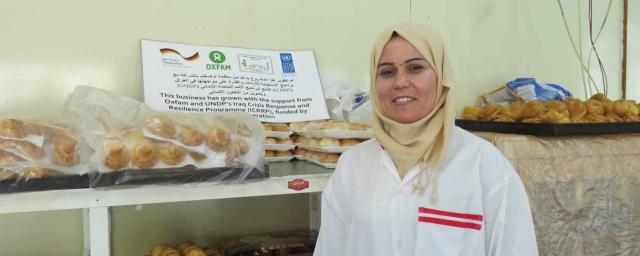
Since the ousting of Saddam Hussein in 2003, the Iraqi population of around 33 million has only been subject to short periods of relative peace as competing interests struggle for control. Years of fighting in central and northern Iraq forced millions of Iraqis to flee their homes. Today, 3,8 million people have already returned home but there is an urgent need for humanitarian assistance, as many areas have completely been destroyed.
Oxfam in Iraq
Oxfam in Iraq aims to build resilience in conflict-affected areas of the country by rehabilitating existing basic services and providing longer-term interventions in the areas of water, sanitation and hygiene (WASH) and emergency food security and vulnerable livelihoods (EFSVL), in coordination with local authorities and partners.
By leveraging our advocacy expertise we hope to influence approaches to humanitarian assistance in order to ensure and protect the rights of all individuals affected by the current conflict.
Since the beginning of the program in Iraq, Oxfam reached almost 2 million people all over Iraq, including 649,723 people in the governorate of Ninewa and nearly 100,000 in Mosul city.
We are also working in Diyala, Kirkuk, and Salahaddin governorates, which include contested territories on both sides of the Disputed Internal Boundaries (DIBs) in towns and villages in both rural and urban communities.
Our work
We are:
- Providing immediate life-saving assistance to displaced people through the provision of drinking water and immediate food rations as they flee conflict-affected areas, as well as cash or e-vouchers to meet critical household needs.
- Rehabilitating water infrastructure, providing sanitation facilities and supporting hygiene promotion activities.
- Providing livelihood opportunities for displaced and returnee families, allowing them to access income while displaced or recently returned. Protection activities including service mapping, information provision and cash for protection, and regular community dialog sessions are also mainstreamed throughout with a gender-sensitive lens and focus.
- As the frontline recedes, Oxfam plans to expand its operations to include new areas in Central Iraq. This includes recently establishing the Oxfam Baghdad office which will coordinate nationwide advocacy and enable partner-led responses to crises as they arise in Baghdad and the surrounding area.
Oxfam's humanitarian response in Mosul
One year after Mosul was retaken from ISIS, thousands of people are still unable or afraid to return home, as parts of the city remain severely damaged and many areas still need to be cleared of unexploded bombs. More than 3,000 houses, schools and shops were destroyed and water networks damaged and there’s no electricity in many buildings. Today, the Old City remains one of the last areas in the city without running water.
For those returning home, the situation is desperate: The lack of water, electricity, secure shelter, basic services, protection and job opportunities makes living conditions dire.
Oxfam is working in the Old City of Mosul fixing the damaged pipelines, repairing pumping stations, rehabilitating school bathrooms, supporting hospitals and providing water pipes and machinery to bring running water to 35,000 out of the 130,000 people who have already returned. The teams have also distributed cash to nearly 3000 people for buying food and other essential items.